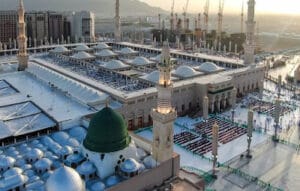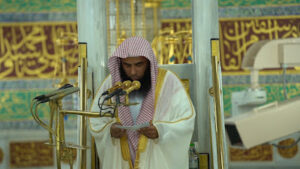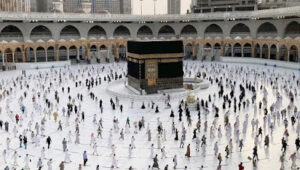His Excellency Sheikh Dr Saleh Al Humaid delivered the Jumu’ah Khutbah on Friday, 17 Jummadi Al Awwal 1442 corresponding to 1st January 2021.
Topic: “Water is a remarkable substance.“
Water is a remarkable substance. It is the most affordable thing when present, but the costliest when absent. Our Lord sent it down without any colour, brought it into being without any flavour, and created it without any odour. It is a palatable and soft substance. However, it causes destruction and drowning when it flows in a large amount; and when it is scarce, life becomes difficult and living creatures become weak. If the water you have ever receded into the ground, could anyone besides Allah ever provide you with water? (Have you ever carefully considered the water that you drink? Is it you who send it down from the clouds, or is Allah the One who sends it down? If Allah wanted, He is completely able to make it unpalatable, so will you not be duly grateful Him?)
In more than sixty places, the Qur’an mentions water, its benefits, its effects, and its blessings. Thus, water manifests Allah’s mercy and blessings, as well as His punishment. There are times of light breeze and small droplets, and other times of torrential downpours. Allah said, ((We indeed carried your forefathers along with the Prophet Nooh aboard the ship that sailed when the water surpassed its usual limits and engulfed all things. We did that to make it an admonition for people, and so that it would be retained by ears that take heed of what they hear)).
When it rains, the Earth puts on its adornment, trees bear their fruits, and plants grow their flowers. Allah said, ((Is it better to worship others, or to worship the One who created the heavens and the Earth, and sent down for you rain from the sky by which We cause beautiful lush gardens to bloom? You could not make their trees grow if He had not sent you rain. Is there anyone besides Allah who does those things and, thus, deserves to be worshipped along with Him? Rather, those who worship deities besides Allah are a people who have strayed from the truth by unjustly equating others with Him)). Allah also said, ((He is the One who sends down water from the sky. You drink from it and it irrigates the vegetation on which you send your cattle to feed. With that water, Allah causes to grow for you crops, olives, date palms, grapevines, and every kind of fruit. This indeed contains clear evidence for people who give thought)).
When rain falls, water channels and valleys flow, and people feel happy. Allah said, ((Allah is the One who sends the winds such that they raise the clouds, spread them throughout the sky as He wills, and then break them into fragments until you see rain drops come from amidst them. Then, when Allah makes them fall upon those among His servants whom He wills, they rejoice)) [30:48]. People then set out to seek relaxation and rejuvenation, and this is something desirable that is part of Islam. Furthermore, people await the rain and they spread the news of its arrival. Thus, Islam’s teachings are ones that contain simplicity and ease. Your own self has rights that you must fulfil, and your family under your care has rights that you must fulfil.
During times of rain, overcast skies, flashes of light in the sky, and flowing valleys, people’s souls rejoice due to Allah’s mercy and grace. Allah said, ((He is the One who sends down the rain, granting relief to people after they lost hope, and He spreads His mercy. He is the Supreme Guardian, the Most Praiseworthy)).
Rejuvenation is beloved to the soul since it provides relaxation and happiness. Seeking rejuvenation and going to places where it can be found to provide opportunities for good companionship, relief from stress, learning new things, and bringing about an increase in good things. Travelling manifests people’s qualities of brotherhood, selflessness, organization, amicability, pleasantness, humour, kind speech, gentleness, patience, humility, helpfulness, and cooperation to do beneficial things. Travelling also provides rest and enjoyment to oneself and one’s company.
In a hadeeth collected by Ahmad in his Musnad and Aboo Daawood in his Sunan [2478, saheeh], ‘Aa’ishah (may Allah be pleased with her) mentioned that the Prophet (may Allah grant him commendation and protection) “would go out to the rural areas where there were hills.” In addition, it was narrated with an authentic chain of transmission that ‘Umar (may Allah be pleased with him) had sent a correspondence to his deputies in the various regions telling them to instruct people during the spring to go to desert areas to see the flowers and the effects of Allah’s mercy.
When in open rural areas, one can contemplate the limitlessness of Allah’s ability, the magnificence of His precision, and the remarkable nature of His creation. Doing such things increases the eemaan in one’s heart, and fills one’s soul with happiness and delight.
To enhance the rest, enjoyment, and benefit derived from what preceded, the following are some of the rulings and conduct to be mindful of in that regard.
One should choose a place that is safe, and free of harms such as snakes, harmful insects, or flash floods. A hadeeth states, “If you settle in a place for the night, stay off of the pathway since it is also the path for other creatures, and a place where certain insects come at night.” This was collected by Muslim. One should also choose good companions who assist him in doing good things and in being happy.
When settling anywhere in the outdoors, one should say the supplication prescribed for settling somewhere, “I seek refuge in the perfect words of Allah against the evils of all that He created.” When one uses that supplication, he would be protected from harm until he leaves the location where he settled. This was collected by Muslim. One should be regular in saying the supplications prescribed for specific times and settings since those provide impervious protection by Allah’s permission. One such supplication is prescribed at times of rain: “O Allah, let this be beneficial rainfall. We have been grated rain out of Allah’s mercy, provision, and favour.”
Additionally, rainfall is one of the times when supplications are answered. A hadeeth states, “Two are not left unanswered: the supplication at the time of the Adhan (call to prayer), and during rainfall.” This was collected by al-Haakim, and graded Hasan by al-Albaanee. If a large amount of rainfalls and harm is feared, one should supplicate, “0 Allah, around us and not upon us. 0 Allah, upon the hills, small mountains, bottoms of the valleys, and places where the trees grow”, as mentioned in a hadeeth collected by al-Bukhaaree and Muslim.
As you should be aware, the preceding supplication is not one for the rain to cease; rather, it is for having the rain directed in ways that provide benefit. Descendants of always Aadam remain in constant need of water.
When rain falls, one should also expose part of his body to get some rain. That is something that was done by the Prophet (may Allah grant him commendation and protection), and he would say, “This rain was recently brought into being by Allah.” This was collected by Muslim.
Another important issue pertaining to the topic of discussion is giving the Adhan (call to prayer) at the prescribed times since anything that hears one call the Adhan – whether it be a jinn, human, stone, or anything else – will testify in his favour on the Day of Resurrection. This was collected by al-Bukhaaree.
When rain falls to the extent that it makes clothing wet and makes the ground slippery, it is permissible to combine prayers: Thuhr with ‘Asr, and Maghrib with ‘Ishaa’. If rainfall is so heavy that people fear for their safety if they were to go to the masjid for prayer in congregation, it is permissible for them to pray in their homes. In such circumstances, the Muadhin is to say when he calls the Adhan: “salloo fee buyootikum” or “salloo fee rihaalikum” (pray in your dwellings).
My beloved brothers, something else to give attention to during such circumstances is that those driving vehicles must remain careful and alert. They are to drive slowly and with care. They must not speed or drive recklessly. They should also avoid areas where water collects, and low-lying places in general. Some drivers – especially young ones – might feel brave and then drive their vehicle into a valley while a great deal of water and mudflow through it. Doing such a thing exposes one’s own self as well as one’s vehicle to being seriously harmed. Many lives and properties have been lost because of doing this sort of thing. I beseech Allah to grant all of you His protection. You must stay away from dangerous locations, and you must ensure that you adhere to the guidelines issued by relevant authorities.
Another point related to the topic is preserving the environment: the trees, plants, flowers, and all that goes along with them; and observing regulations that have been put in place. You should avoid things like littering parks and the outdoors with garbage and leftover food, vandalizing facilities, gathering wood in an unauthorized manner, and pasturing animals in an unauthorized manner. You should also ensure to extinguish fires before sleeping at night.
Other related points include being helpful to those who require assistance or ask for directions, and avoiding harming others in close proximity by raising one’s voice or making one’s surroundings unclean. When in the outdoors, people should avoid things like contravening Islam’s teachings, committing sins in the open for all to see, engaging in recreational activities that are impermissible, exposing the body in impermissible ways, and treating prayer times lightly.
We beseech Allah – out of His grace and favour – to rejuvenate His servants, their hearts, and their lands; to send rain that allows lives to continue for a long while; to make the rains He sends ones of mercy; and to not make the rains ones of punishment, destruction, adversity, or drowning. He is indeed Most Generous, Most Kind.
Rain is blessed water that is palatable and purifying. Our Lord sends it down from the clouds and He lets it bring forth from the earth seeds, grains, and lush gardens. I beseech Allah to grant all of you His protection. Some other points to keep in mind about the rainfall are that one should feel happy due to it, be grateful to Allah for it, and hold the unwavering belief that the rain came because of Allah sending it; not because of any star or season. There is no harm in matters related to weather forecasts, rain predictions, wind speeds and directions, or other such climate-related information that is based on scientific facts or astronomical calculations. Nothing is wrong with knowing and speaking about those things, since they are part of the universal laws that Allah decreed and among the facets of knowledge that Allah has allowed His servants to have. However, it must always be borne in mind that all things are controlled by Allah – who is perfect in every way – and all matters lie in His hand. What His servants predict based on their knowledge may or may not end up happening. You must realize that some of the most effective means of attaining rainfall include observing taqwa of Allah, remaining steadfast in complying with His directives, repenting to Him, asking His forgiveness, being humble towards Him, genuinely returning to Him, obeying Him, and performing righteous deeds. Additionally, a hadeeth states that “a drought is not merely for you to not have rainfall; rather a drought is for you to receive repeated rainfall but still not have anything grow from the earth.” This was collected by Muslim.





